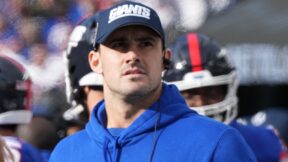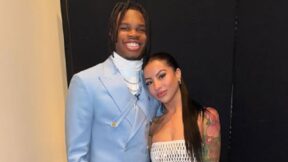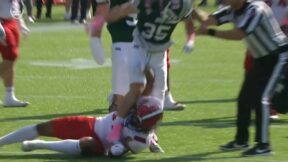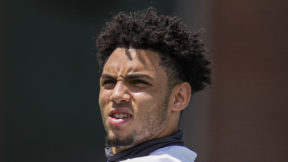Why MLB wants more African-Americans in baseball, and how to fix it
 Each April it seems like we see the same stories about the lack of African-Americans in Major League Baseball. The stories seem to be published around the time when we celebrate the anniversary of Jackie Robinson breaking the color barrier in baseball on April 15, 1947.
Each April it seems like we see the same stories about the lack of African-Americans in Major League Baseball. The stories seem to be published around the time when we celebrate the anniversary of Jackie Robinson breaking the color barrier in baseball on April 15, 1947.
This year is not an exception.
Not only is Jackie Robinson Day coming up on Monday, but a new movie about Robinson called “42” that was released this week has heightened awareness over the decline of African-Americans in the game. MLB commissioner Bud Selig has created a task force to address the issue.
When we published our story on Selig’s plan to create a task force, we immediately saw a great deal of opposition to the plan. People were asking why a lack of African-Americans in baseball is a problem, and why affirmative action is needed in the game.
Though I would hardly equate the creation of a task force to instituting affirmative action, some of the points are valid. I have even expressed such views in the past. Think about it: baseball is an open, non-judgmental game. Spots are earned based on ability and performance. Anyone can play regardless of race or skin color. Why should there be concern about one culture of athletes over any others?
These are good questions to ask, so allow me to explain why MLB wants more African-Americans in the game. There are two prominent reasons why Major League Baseball wants more African-Americans in the sport.
First, baseball has a history of being a “white man’s game”. Blacks were excluded from playing in MLB the first half of the 20th century. It was a great moment in the history of our country when Jackie Robinson broke the color barrier because it helped break down other lines of segregation throughout the U.S.
Robinson proved that African-Americans are among the best baseball players on the planet. After Robinson came Larry Doby and then guys like Monte Irvin, Ernie Banks, and Willie Mays, who all proved their greatness. Many Hall of Famers and record holders in the game’s history are black players. Hank Aaron was the home run champ, Bob Gibson won Cy Youngs, and players like Doc Gooden and Rickey Henderson later dominated. From Frank Robinson to Barry Bonds, Barry Larkin, and Joe Morgan, some of the best players in history are African-American.
Though the focus is on African-American players, keep in mind that MLB has become global. There are numerous Hispanic and Asian players in the game, so I love the way it has become multi-cultural, but who does not want the future to include African-Americans?
The second reason MLB wants more African-Americans in baseball is because, for reasons just outlined, it would improve the quality of the game. I could add more names to the list of players previously mentioned. Frank Thomas, Tony Gwynn, Lee Smith, Andre Dawson, Jim Rice, Tim Raines, Gary Sheffield, Eddie Murray, Roy Campanella, Don Newcombe, Joe Carter … the list of great African-American players goes on and on and on. It is undeniable that some of the best players in history have been African-American.
MLB wants to have the best league in professional sports. It wants players in the league who will entice fans to watch them on TV or buy tickets to see them at the ballpark. The league wants to have players that draw attention and force us to discuss them. They want players who leave us in awe of their abilities. Isn’t that why the NBA has become so popular? Haven’t LeBron James and Kobe Bryant given us reasons to watch and continue watching basketball? Didn’t Michael Jordan truly put the NBA on the map? Isn’t that also the same reason why golf surged in popularity when Tiger Woods emerged?
What makes sports permeate conversations is greatness. It’s the amazing athletic feats that capture our attention. In baseball, it’s the huge home run, or the diving catch, or the unhittable pitch that makes us talk. MLB needs the best athletes in the country playing baseball in order to remain a popular, relevant sport.
That is why they have a task force assigned to get more African-Americans in the game.
They don’t want to lose phenomenal athletes like LeBron James to basketball; they want guys like Torii Hunter and Carl Crawford who chose professional baseball over football or basketball. Why? Because those amazing players make the sport better.
I don’t have all the answers for how to increase the amount of African-Americans in baseball. I do know that some of the problems are that playing baseball growing up is difficult. Top of the line equipment such as gloves and bats cost hundreds of dollars, uniforms are expensive, and you need several other players in order to properly practice. Basketball, by comparison, requires just one person, a ball, and a court. It’s much easier for a young person. But MLB has created RBI (Reviving Baseball in the Inner-City) to help address the issue, and that is a great start.
I’ll tell you one other change they need to make in order to attract more African-Americans to the sport. MLB needs to address the draft bonus pools system. Currently, MLB has a system where they put a cap on the amount of bonus money teams can offer draft picks selected in the first 10 rounds. The Houston Astros will have the largest cap in 2013 — $11.69 million to spend on top 10 picks. Other teams like the Washington Nationals or Los Angeles Angels will have less than $3 million to spend in bonuses on their top 10 picks.
How is a professional baseball team supposed to sway a prospect who has a college football or basketball scholarship offer to come play for them if they have such limited funds to offer? Do you think a $250,000 bonus offered to a D-I athlete is enough to get them to play baseball? Let’s be real: If an athlete thinks they’re going pro in basketball or football, they’re not going to sign for that little. And let’s also be real about something else: Many top high school athletes are probably being offered at least as much money from boosters of top college programs.
If MLB wants to get top high school athletes to choose baseball over other sports, they have to allow teams the chance to make it financially worthwhile for those players.
Photo by Bob Sandberg Look photographer






